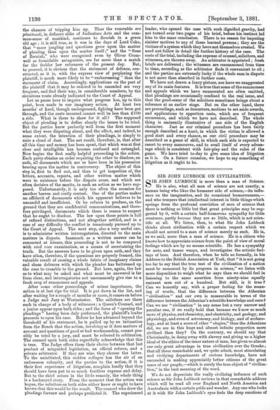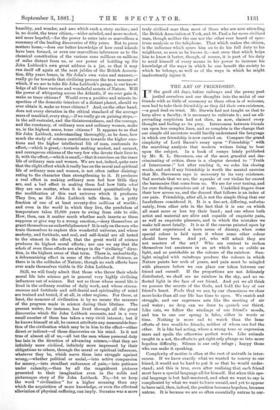SIR JOHN LUBBOCK ON CIVILISATION.
SIR JOHN LUBBOCK is more than a man of Science. He is also, what all men of science are not exactly, n human being who likes the humaner side of science,—its influ- ence on the imagination, and its occasional humorousness,— and who tempers that intellectual interest in little things which springs from the profound conviction of men of science that there is nothing so little but that great principles may be sug- gested by it, with a certain half-humorous sympathy for little creatures, partly because they are so little, which is not scien- tific at all. We listen, then, to what Sir John Lubbock thinks about civilisation with a certain respect which we should not accord to a man of science merely as such. He is, as we said, more than a man of science. He is a citizen who knows how to appreciate science from the point of view of moral feelings which are by no means scientific. He has a sympathy for ants, and tames wasps, and investigates the artistic feel- ings of bees. And therefore, when he tells us formally, in his Address to the British Association at York, that "it is not going too far to say that the true test of the civilisation of a nation must be measured by its progress in science," we listen with more disposition to weigh what he says than we should feel in listening to the same assertion from ninety-nine equally eminent men out of .a hundred. But still, is it true ? Can we honestly say, with a proper feeling for the mean- ing of words, that the difference between the Athenian "civilisation" and our own is measurable in terms of the difference between the Athenian's scientific knowledge and ours? Can we use "civilisation" in any sense but a very narrow and peculiar one, if we really hold that because we know so much more of physics, and chemistry, and electricity, and geology, and physiology, and even of astronomy, and biology, and of amine°. logy, and at least a score of other " ologies," than the Athenians did, we are in this huge and almost infinite proportion more civilised than they? On the contrary, we should say that Christianity, in doing away with slavery and giving us a higher ideal of the ethics of the inner nature of man, has given us almost our only great advantage in true civilisation over the Greeks ; that all these remarkable and, we quite admit, most stimulating and vivifying departments of curious knowledge, have not succeeded in making appreciably better citizens of the great mass of our people,—which is surely the true object of "civilisa- tion," iu the best meaning of the word.
We do not depreciate the really civilising influence of such science as Sir John Lubbock reviews in that remarkable address which will be read all over England and North America and Australasia with a certain pride and wonder. Any one who looks at it with Sir John Lubbock's eyes feels the deep emotions of
humility, and wonder, and awe which such a story excites ; and is, no doubt, the timer citizen,—wider-minded, and more modest, and more hopeful,—for the power to enter into so marvellous a summary of the leading discoveries of fifty years. But to press matters home,—does our better knowledge of how coral islands have been formed, or even our marvellous inferences as to the chemical constitution of the various suns millions on millions of miles distant from us, or our power of bottling up Sir J-ohn Lubbock's own great address in a jar, so that it may run itself off again at the next jubilee of the British Associa- tion, fifty years hence, in Sir John's own voice and manner,— really go far towards that civilising process the true measure of which, if we are to take Sir John Lubbock's gauge, is our know- ledge of all these various and wonderful secrets of Nature. Will the power of whispering across the Atlantic, if we ever gain it, make us truer citizens? Would even a positive and minute in- spection of the domestic interiors of a distant planet, should we ever obtain it, make us truer citizens ? And, on the other hand, does not every elevation in the ethical standard of the average mass of mankind, every step,—if we really go on gaining steps,— in the self-restraint, and the disinterestedness, and the courage, and the constancy, of ordinary men and ordinary women, make us, in the highest sense, truer citizens ? It appears to us that Sir John Lubbock, understanding thoroughly, as he does, how much the study of science contributes towards the higher emo- tions and the higher intellectual life of man, confounds its effect,—which is great,—towards making modest, and earnest, and courageous citizens of the very few who devote their lives to it, with the effect,—which is small,—that it exercises on the inner life of ordinary men and women. We are not, indeed, quite sure that the slight effect which it really has on the moral and spiritual life of ordinary men and women, is not often rather disinteg- rating to the character than strengthening to it. It produces a real effect in making ordinary men feel how little they are, and a bad effect in making them feel how little what they are can matter, when it is measured quantitatively by the modification of this vast universe which it produces. They live, as Sir John Lubbock tells them, in a petty fraction of one of at least seventy-five millions of worlds ; and even in the world in which they live, the pendulum of temperature takes 21,000 years to swing from side to side, How, then, can it matter much whether such insects as these suppress or give way to a wrong emotion,—deny themselves or grant themselves an unlawfulpleasnre P It is only on the men who train themselves to explore this wonderful universe, and whose modesty, and fortitude, and zeal, and self-denial are all tested to the utmost in the effort, that the great world of science produces its highest moral effects ; nor can we say that the whole of even these effects are always in the "civilising" direc- tion, in the highest sense of that term. There is, undoubtedly, a dehumanising effect in some of the solitudes of Science, as there is in the solitudes of Nature ; though no such effects have ever made themselves visible in Sir John Lubbock.
Still, we will freely admit that those who throw their whole moral life into science get in general very highly civilising influences out of science. But not so those whose moral life is lived in the ordinary routine of daily work, and whose strenu- ousness and fortitude and self-denial and spirituality of mind are trained and tested, if at all, in other regions. For these, at least, the measure of civilisation is by no means the measure of the progress made in science during their lifetime. The present writer, for instance, has lived through all the great discoveries which Sir John Lubbock recounts, and in a very small number of them has taken a very vivid interest ; but if he knows himself at all, he cannot attribute any measurable frac- tion of the civilisation which may be in him to the effect—either direct or indirect—of those discoveries on his mind. Is it not true of almost all of us,—all but the men whose personal duty has lain in the direction of advancing science,—that they are infinitely more civilised, infinitely more impressed by their obligations to others, through the moral or spiritual influences, whatever they be, which nerve them into struggle against wrong,—whether political or social,—into active compassion for misery,—into steadfast endurance of pain,—into patience under calamity,—than by all the magnificent pictures presented to their imagination even in the noble and picturesque story of Sir John Lubbock. No,—let us keep the word "civilization" for a higher meaning than any which the acquisition of mere knowledge, or even the effectual alleviation of physical suffering, can imply. Socrates was a more truly civilised man than most of those who are now attending the British Association at York, and St. Paul a far more civilised man, though neither the one nor the other ever heard of spec- trum analysis or the telephone. That which makes the citizen, is the influence which spurs him on to do his full duty to his neighbour, so soon as he knows it,—not even that which helps him to know it better, though, of course, it is part of his duty to avail himself of every means in his power to increase his knowledge of the ways in which he can benefit the society to which he belongs, as well as of the ways in which he might inadvertently injure it.



































 Previous page
Previous page